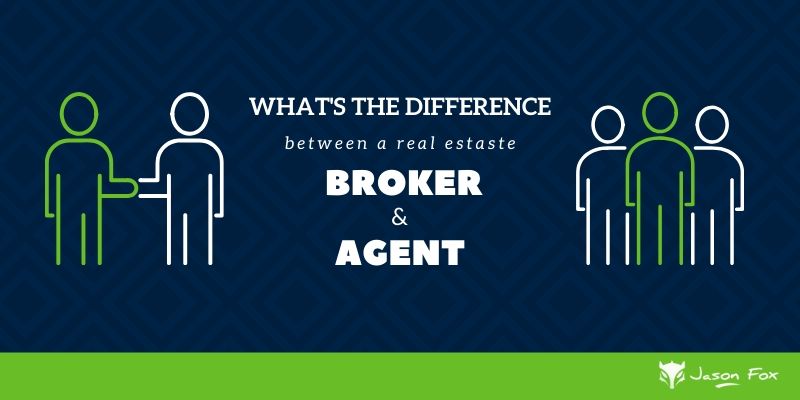What’s The Difference Between a Real Estate Broker and Agent
How Does a Real Estate Agent Differ From a Real Estate Broker?
Are you confused about the difference between a real estate broker and a real estate agent? If you are buying a home or investing in property for the first time, you will come across new terms that you may not have heard about before. It can be a bit of a minefield and can take some getting used to.
[click_to_tweet tweet=”Confused about the difference between a real estate broker, a real estate agent & a Realtor? Let’s explore the differences…” quote=”Confused about the difference between a real estate broker, a real estate agent and a Realtor? Let’s explore the differences…” theme=”style3″]
Many buyers that are new to the real estate market find it hard to remember all of the different terms and expressions. When you buy a home for the first time, there is a lot you need to learn. Unfortunately, one of the things that makes it even more confusing is that agents often interchange the words they use. It is not uncommon at all for the words real estate agent, Realtor, and broker all to describe the same thing.
The problem is all three of these terms have different meanings. Let’s explore the differences between a real estate agent and a broker. You’ll also learn how both of these are not the same as being a Realtor.
What Is A Real Estate Broker vs. Real Estate Agent?
A real estate broker is a person who usually has more experience than a real estate agent. Except in Washington where a real estate broker is a real estate agent.
The qualifications vary slightly from state to state, but in general, there are some standard qualifications that you need to pass to become a real estate broker. Most people who work as real estate brokers have already had at least some working-experience as real estate agents.
In order to become a real estate broker, you will need to have at least two years of experience as a real estate agent. On top of that, you will need to have passed a specialist broker exam and completed eight real estate courses at the college level. Alternatively, you can have completed a 4-year college degree course. But, no matter what your educational background, you need to pass the exam.
In WA state this level of qualification is called a Managing Broker.
Most real estate brokers own their own real estate companies, although some agents get their brokerage license without ever opening up their own business.
My Attorney Is A Real Estate Agent
Yes, your lawyer or attorney can indeed work as a real estate broker.
Once he has passed the bar exam, he is free to work as a real estate agent broker after having passed the broker exam.
In simple terms, a real estate broker will have more qualifications than a real estate agent. In fact, a broker can employ real estate agents and typically do. You will often find a broker working in an office together with one or more real estate agents.
Is it more expensive to deal with a real estate broker? Most of the time, it does not cost you any more to use a real estate agency that employs a broker.
It should be noted that just because an agent also holds their broker’s license doesn’t necessarily mean they are move skilled at selling real estate. In fact, far from it. Some of the best real estate agents in the country have no desire to become brokers. They enjoy selling far more than managing other sales associates, which is what a real estate broker does that owns their own company.
What Is A Real Estate Agent?
A real estate agent is a person who is licensed to sell a property.
Can a real estate agent work on their own? No, a real estate agent can’t work on their own. By law, they several to work for a broker. Not all real estate agents go on to become brokers.
There is a general misconception that you automatically become a broker after having worked as a real estate agent for several years. That is not true. To work as a broker, you need to have passed the relevant exam.
What Is A Realtor?
So how do a real estate broker and agent differ from being a Realtor?
A Realtor is a person who is a member of the National Association of REALTORS. NAR is a professional organization that both agents and brokers can belong to.
All Realtors work to a specific code of conduct. This is referred to as the code of ethics in real estate. There are seventeen articles that discuss the basic principles you must follow. In becoming a Realtor, you pledge to put the interests of your clients ahead of your own always!
If you have any complaints against a broker or a real estate agent that belongs to the National Association of Realtors, you can file a complaint against them with the local NAR board.
You will find that persons who are Realtors usually also belong to local and state trade organizations. Listing or buying a property from someone who belongs to NAR should give you extra peace of mind.
Other Terminology Describing Agents
Three different terms describing agents are the following:
-
- The listing agent – a listing agent, is the representative a seller has chosen to market their home. The term “listing agent” and “seller’s agent” are synonymous with one another.
- A selling agent – a selling agent, is the representative of the buyer. Selling agents are also referred to as a buyer’s agent. They mean the exact same thing.
- A dual agent – a dual agent, works with both the buyer and the seller within the same transaction.
The term listing agent means the person who has been chosen by the seller to market their property. They are responsible for listing a seller’s property and are always qualified real estate agents, Realtors, or brokers.
A buyer’s agent works hand in hand with the buyer as their fiduciary. Buyers agents are sometimes called a selling agent. They work on behalf of the buyer matching the buyer up with the right property. Buyer’s agents do a myriad of tasks for their clients.
A dual agent is someone who deals with both the buyer and seller in the same transaction. The practice is referred to as dual agency. This type of agency is not legal in all states due to the conflict of interest it presents. In dual agency, the agent becomes a neutral party. By law, the agent is no longer able to provide the same services they would if working as an exclusive buyer’s or seller’s agent.
Buyers and sellers should understand that when you allow dual agency, YOUR agent no longer represents you anymore.
Besides Managing Does a Broker Have Additional Responsibilities?
One other significant difference between a real estate agent and broker is caring for the buyer’s funds in a transaction.
A broker is responsible for holding the buyer’s earnest money deposit in what’s known as an escrow account until closing. These monies are duly accounted for at the time of the closing.
A real estate agent has no financial responsibility for a buyer’s deposit other than delivering it to the broker or managing broker of record.
Owner vs. Real Estate Broker
It should be understood that you can own a real estate company without having your real estate brokerage license.
Some owners of real estate firms choose to be silent partners. They decide to stay out of the day to day operations of the business but hold a financial stake in the company.
The broker or managing broker, on the other hand, would typically be at the office on a daily basis managing all of the agents under his or her license. Real Estate brokers can best be described as problem solvers. They are often involved in resolving issues between real estate agents, as well as consumers.
Brokers for most real estate franchises also make the rules for agents that work under them. For example, a company may choose not to allow an agent to market a home before it is officially on the market. In real estate circles, this is known as a pocket listing or in-house home sale. Many will argue that allowing pocket listings does not serve the best interests of the consumer. In fact it is a violation of NWMLS policy in Washington.
It is decisions such as these that a broker could make part of their office policy.
Final Thoughts
When buying or selling a home, the agent you choose will have a significant bearing on your success. Whether you are working with a real estate agent, real estate broker, or Realtor, they should be vetted carefully. The worst decisions in choosing an agent are made in haste. Always do a careful interview of multiple agents to increase your odds of success.
No matter what, make sure that you deal with a professional person who can prove that he or she is a qualified real estate broker or real estate agent. Most of them proudly display their certificates in their office, and there is seldom a need to ask.
If you find you’ve made a poor decision in the agent you selected, try to solve this problem right away. It is advisable to make an appointment with the broker of record and explain your issues. If the broker is an intelligent decision-maker, they should attempt to make you happy.
About the author: The above article on what’s the difference between a real estate agent and a broker was written by Bill Gassett. Bill is an accomplished writer who publishes content on his blog, Maximum Real Estate Exposure, along with other prestigious publications such as RIS Media, The National Association of Realtors, Inman News, and others
post contents
How Does a Real Estate Agent Differ From a Real Estate Broker?
Are you confused about the difference between a real estate broker and a real estate agent? If you are buying a home or investing in property for the first time, you will come across new terms that you may not have heard about before. It can be a bit of a minefield and can take some getting used to.
[click_to_tweet tweet=”Confused about the difference between a real estate broker, a real estate agent & a Realtor? Let’s explore the differences…” quote=”Confused about the difference between a real estate broker, a real estate agent and a Realtor? Let’s explore the differences…” theme=”style3″]
Many buyers that are new to the real estate market find it hard to remember all of the different terms and expressions. When you buy a home for the first time, there is a lot you need to learn. Unfortunately, one of the things that makes it even more confusing is that agents often interchange the words they use. It is not uncommon at all for the words real estate agent, Realtor, and broker all to describe the same thing.
The problem is all three of these terms have different meanings. Let’s explore the differences between a real estate agent and a broker. You’ll also learn how both of these are not the same as being a Realtor.
What Is A Real Estate Broker vs. Real Estate Agent?
A real estate broker is a person who usually has more experience than a real estate agent. Except in Washington where a real estate broker is a real estate agent.
The qualifications vary slightly from state to state, but in general, there are some standard qualifications that you need to pass to become a real estate broker. Most people who work as real estate brokers have already had at least some working-experience as real estate agents.
In order to become a real estate broker, you will need to have at least two years of experience as a real estate agent. On top of that, you will need to have passed a specialist broker exam and completed eight real estate courses at the college level. Alternatively, you can have completed a 4-year college degree course. But, no matter what your educational background, you need to pass the exam.
In WA state this level of qualification is called a Managing Broker.
Most real estate brokers own their own real estate companies, although some agents get their brokerage license without ever opening up their own business.
My Attorney Is A Real Estate Agent
Yes, your lawyer or attorney can indeed work as a real estate broker.
Once he has passed the bar exam, he is free to work as a real estate agent broker after having passed the broker exam.
In simple terms, a real estate broker will have more qualifications than a real estate agent. In fact, a broker can employ real estate agents and typically do. You will often find a broker working in an office together with one or more real estate agents.
Is it more expensive to deal with a real estate broker? Most of the time, it does not cost you any more to use a real estate agency that employs a broker.
It should be noted that just because an agent also holds their broker’s license doesn’t necessarily mean they are move skilled at selling real estate. In fact, far from it. Some of the best real estate agents in the country have no desire to become brokers. They enjoy selling far more than managing other sales associates, which is what a real estate broker does that owns their own company.
What Is A Real Estate Agent?
A real estate agent is a person who is licensed to sell a property.
Can a real estate agent work on their own? No, a real estate agent can’t work on their own. By law, they several to work for a broker. Not all real estate agents go on to become brokers.
There is a general misconception that you automatically become a broker after having worked as a real estate agent for several years. That is not true. To work as a broker, you need to have passed the relevant exam.
What Is A Realtor?
So how do a real estate broker and agent differ from being a Realtor?
A Realtor is a person who is a member of the National Association of REALTORS. NAR is a professional organization that both agents and brokers can belong to.
All Realtors work to a specific code of conduct. This is referred to as the code of ethics in real estate. There are seventeen articles that discuss the basic principles you must follow. In becoming a Realtor, you pledge to put the interests of your clients ahead of your own always!
If you have any complaints against a broker or a real estate agent that belongs to the National Association of Realtors, you can file a complaint against them with the local NAR board.
You will find that persons who are Realtors usually also belong to local and state trade organizations. Listing or buying a property from someone who belongs to NAR should give you extra peace of mind.
Other Terminology Describing Agents
Three different terms describing agents are the following:
-
- The listing agent – a listing agent, is the representative a seller has chosen to market their home. The term “listing agent” and “seller’s agent” are synonymous with one another.
- A selling agent – a selling agent, is the representative of the buyer. Selling agents are also referred to as a buyer’s agent. They mean the exact same thing.
- A dual agent – a dual agent, works with both the buyer and the seller within the same transaction.
The term listing agent means the person who has been chosen by the seller to market their property. They are responsible for listing a seller’s property and are always qualified real estate agents, Realtors, or brokers.
A buyer’s agent works hand in hand with the buyer as their fiduciary. Buyers agents are sometimes called a selling agent. They work on behalf of the buyer matching the buyer up with the right property. Buyer’s agents do a myriad of tasks for their clients.
A dual agent is someone who deals with both the buyer and seller in the same transaction. The practice is referred to as dual agency. This type of agency is not legal in all states due to the conflict of interest it presents. In dual agency, the agent becomes a neutral party. By law, the agent is no longer able to provide the same services they would if working as an exclusive buyer’s or seller’s agent.
Buyers and sellers should understand that when you allow dual agency, YOUR agent no longer represents you anymore.
Besides Managing Does a Broker Have Additional Responsibilities?
One other significant difference between a real estate agent and broker is caring for the buyer’s funds in a transaction.
A broker is responsible for holding the buyer’s earnest money deposit in what’s known as an escrow account until closing. These monies are duly accounted for at the time of the closing.
A real estate agent has no financial responsibility for a buyer’s deposit other than delivering it to the broker or managing broker of record.
Owner vs. Real Estate Broker
It should be understood that you can own a real estate company without having your real estate brokerage license.
Some owners of real estate firms choose to be silent partners. They decide to stay out of the day to day operations of the business but hold a financial stake in the company.
The broker or managing broker, on the other hand, would typically be at the office on a daily basis managing all of the agents under his or her license. Real Estate brokers can best be described as problem solvers. They are often involved in resolving issues between real estate agents, as well as consumers.
Brokers for most real estate franchises also make the rules for agents that work under them. For example, a company may choose not to allow an agent to market a home before it is officially on the market. In real estate circles, this is known as a pocket listing or in-house home sale. Many will argue that allowing pocket listings does not serve the best interests of the consumer. In fact it is a violation of NWMLS policy in Washington.
It is decisions such as these that a broker could make part of their office policy.
Final Thoughts
When buying or selling a home, the agent you choose will have a significant bearing on your success. Whether you are working with a real estate agent, real estate broker, or Realtor, they should be vetted carefully. The worst decisions in choosing an agent are made in haste. Always do a careful interview of multiple agents to increase your odds of success.
No matter what, make sure that you deal with a professional person who can prove that he or she is a qualified real estate broker or real estate agent. Most of them proudly display their certificates in their office, and there is seldom a need to ask.
If you find you’ve made a poor decision in the agent you selected, try to solve this problem right away. It is advisable to make an appointment with the broker of record and explain your issues. If the broker is an intelligent decision-maker, they should attempt to make you happy.
About the author: The above article on what’s the difference between a real estate agent and a broker was written by Bill Gassett. Bill is an accomplished writer who publishes content on his blog, Maximum Real Estate Exposure, along with other prestigious publications such as RIS Media, The National Association of Realtors, Inman News, and others
Latest articles
Short real estate videos can be transformed into powerful blog content with the right strategy. Learn how to expand on video topics, incorporate SEO best practices, and create engaging posts that drive traffic and boost your search rankings.
Learn how to create real estate community pages that attract buyers, boost your local SEO, and establish you as a market expert. This ultimate guide covers content creation tips, the use of AI tools, and IDX integration to help your pages stand out in 2024.
To stay competitive in real estate, agents must prioritize SEO to improve their Google visibility. By implementing proven strategies like asking for reviews, creating relevant content, and focusing on local SEO, you can attract more clients and increase your online presence.
BECOME A MEMBER
Become A Free DIY Real Estate Marketing Member & Get Access To:
LARGEST COLLECTION OF
Real Estate Marketing e-Books, Guides, Templates, & whitepapers
ON THE INTERNET
+ OVER 70 How To Website Training Videos including; WordPress, Agent Evolution Themes, & IDX Broker
+ DIY Real Estate Marketing Tips and Strategies Delivered to Your Inbox
Share this article
Written by : jasonfox
Jason Fox - Real Estate Marketing
Business: We build WordPress Real Estate Websites with IDX
Me: #GoHawks, #BringBackTheSonics, #MaybeNextYearMariners, #ILoveMyKids #SeattleSunLover #SeattleWaterLover #BFF
Blog: Focuses on Wordpress Websites, Content Management, SEO Services, SEM Campaigns, Social Media Marketing, Email Marketing, Beautiful Design, IDX, and more.






Hao Finder acknowledges the good work done here
You have provided good information on this article and You have explained the topic well on this article, also thanks for sharing it with us.
Good information about the difference between a real estate broker and agent. This article gives me great insight and i really appreciated. Thank you for this.